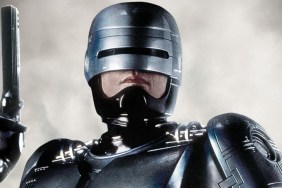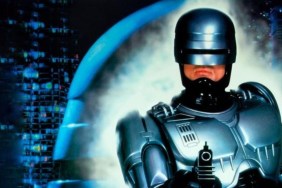Paul Verhoeven’s RoboCop is awesome. 35 years later, the sci-fi, action-adventure still packs quite the punch and stands as a remarkable example of bold, audacious filmmaking. Truly, they don’t make ’em like this anymore.
Mostly because, well, they can’t. Marketers wouldn’t allow a film of this nature to go into production with anything but a minuscule budget. That’s not to say we don’t get the occasional wild swing from studios — see The Northman and Everything Everywhere All at Once, for example. Though, such entries are few and far between, and largely ignored by audiences.
The 1980s, however, were an exciting time for motion pictures. Light-hearted adventures of the 1950s and 60s had given way to the grit and grime of the 1970s, during which filmmakers such as Martin Scorsese, Steven Spielberg, George Lucas, Francis Ford Coppola, and Brian DePalma redefined the very nature of cinema; and crafted antiheroes and films steeped in realistic violence. Studios were willing to take a few risks here and there, resulting in some of the best movies ever to grace cinemas. (There was also a fair share of duds, to be sure, but you get the gist.)
Even so, there was a clear divide between adult pictures such as The Godfather, Mean Streets, and Carrie and family/commercial fare like Jaws, Star Wars, and Indiana Jones. Verhoeven’s RoboCop smashes through that divide to deliver an R-rated commercial vehicle catered to adults, albeit one coated with a wicked-smart sense of satire.
Sure, RoboCop blows shit up real well but does so with purpose. Here is a film that dazzles the senses and tickles the mind. In other words: it’s the ultimate 80s movie.
Indeed, there are a number of video essays exploring the intricacies of Verhoeven’s film, all of which spend a great deal of time pointing out the symbolism of the overt violence and the larger message about the dangers of corporations (that have somehow become more powerful than the military). For me, RoboCop stands out mainly for its sheer boldness; and crass humor. Take, for example, the memorable sequence in which a massive robot called ED-209 malfunctions and all but eviscerates a hapless corporate stooge:
The sequence is shocking in its brutality, but also comical in how far it’s willing to go. On top of that, the feigned reaction from the Old Man (Dan O’Herlihy) — “Dick, I’m very disappointed!” — absolutely sells the point — those at the top have lost all sense of morality and decency, leaving regular folks to scramble amidst the carnage created by their lack of humanity. The message was quite relevant during the 1980s but seems just as relevant in our modern age of rampant crime, murder, drugs — all presided over by politicians and corporate big wigs who could give two shits about ordinary folk, so long as we continue to purchase their products.
It’s interesting that the one character in the film, Murphy as RoboCop, is the one who attains the most humanity — but only after shedding his person of the artificiality installed by Omni Consumer Products (OCP). In many ways, the very idea of RoboCop feels like a cynical publicity stunt. When Murphy (Peter Weller) is viciously gunned down by Clarence Boddicker (Kurtwood Smith), there’s no sense of remorse or pity for the slain police officer, but, rather, a sense of jubilation at the opportunity to test out the RoboCop program. They don’t even allow the poor guy to keep his memories.
RoboCop is an awesome weapon, capable of wiping out armies of bad guys with utmost precision. He’s the perfect machine, our own personal Jesus Christ (who even walks on water at one point!) comes to cleanse the world of corruption running rampant on the streets. Except, like Matt Reeves’ The Batman, RoboCop/Murphy quickly learns that its not enough to kill lowly gangsters or street-level thugs, not when the true criminals exist in the high rises overlooking Detroit. And so, the finale to Verhoeven’s masterpiece doesn’t involve a shootout or a one-on-one fight sequence between RoboCop and ED-209. Instead, our hero storms into a board meeting and kills evil mastermind Dick Jones (Ronny Cox) in a manner similar to John Wayne — he blows him out of a window without remorse.
Interestingly, he can’t kill Dick until the Old Man uses his corporate power to fire him. It’s an ironic end for the bad guy, though we see others chomping at the bit to take his place.
“Nice shooting, son,” the Old Man says whilst straightening his tie, “what’s your name?”
“Murphy,” RoboCop says with a smile, his character arc now complete. (There’s not a moment of wasted time in RoboCop. The film cuts right to the chase, eliminates any excess; and delivers its story in under two hours. Yet, it feels 100% complete.)
Another clever aspect of this scene is just how cheesy it is. Felton Perry’s OCP executive, Donald Johnson, even gives the atypical thumbs up after Dick goes flying out the window. And even the Old Man’s declaration of “You’re fired!” is a troupe used in many an action movie from Beverly Hills Cop II to True Lies, except RoboCop uses the line for another bit of sly humor punctuated by more gratuitous gore.
Indeed, by all accounts, RoboCop is a cheesy action adventure, but Verhoeven’s use of satire and violence make the picture inaccessible for children (despite a spinoff cartoon and toy line) — even if the final product is very much designed to appeal to kids. (Interestingly, the sequels and TV spinoffs failed because they turned RoboCop into an out-and-out action hero; and jettisoned the intricacies that made him a memorable character. The sequels are all cheese with no bite.) Really, RoboCop may have worked as a straight-up action film in the vein of, say, Raiders of the Lost Ark or The Terminator. But that’s all it would have been — a straight-up action film. In this case, the extreme violence, sly satire, and social commentary are what lift RoboCop to grandiose heights. There’s a purpose behind everything in RoboCop, and it’s easy to see the love and craft that went into the creation of this 80s gem.
Truly, they don’t make them like this anymore.
I can only imagine being a teenager in the 1980s. Every year saw the release of a classic action film — Aliens, The Terminator, Raiders of the Lost Ark, Die Hard, Beverly Hills Cop, 48 Hours, Rambo, Ghostbusters, Lethal Weapon, The Thing, Blade Runner, etc. What a time to be alive. And while, yes, technology has gotten better over the years, resulting in modern classics such as Inception and Dune, the grit and grime of the 80s was one of the characteristics that made the decade so special. Commercial vehicles were handled with tremendous care and pumped full of ingenuity … and while there were the occasional atrocities crafted by studios eager to cash in on big budget success, even duds like Howard the Duck and Willow are gutsy misfires that feature enough creativity to warrant a look or two.
Still, out of all of these films, RoboCop remains the shining classic example of the 80s era — a time fueled by excess and violence. Yes, Verhoeven’s film is extreme to the max, but it’s also a glorious reminder of what a commercial product can be if placed in the right hands.
Why RoboCop Never Became a Dominant Franchise
RoboCop was released 35 years ago on July 17, 1987, when it earned an impressive $53.4 million despite its R-rating and controversial content. Its success paved the way for two sequels, the entertaining, though underwhelming, RoboCop 2 and the awful PG-13-rated RoboCop 3, a so-so 2014 reboot, RoboCop, starring Joel Kinnaman and Gary Oldman, a 1988 animated series; and a 1994 TV series, to say nothing of the numerous comic books, video games, and merchandise spin-offs. There was talk of a quasi-reboot, aptly titled RoboCop Returns, which was to be directed by Neil Blomkamp, but the District 9 director has since stepped away from the project, leaving it in limbo.
Honestly, I’m not sure you can make a direct sequel to RoboCop. It wasn’t designed as a franchise to begin with. Murphy’s entire arc takes place in the original film. Once he discovers his true identity and comes to terms with who he is, that’s the end of the film. So, unless you’re going to completely rebrand the character (as attempted in the 2014 remake), you might as well steer clear, because RoboCop is one of those lighting-in-a-bottle-type pictures that carry the brand as far as it can go.










